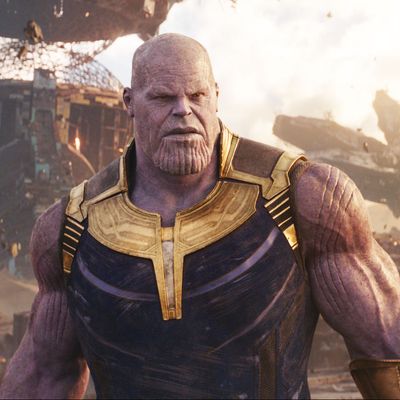
When it comes down to it, there are only a finite amount of villainous schemes. Maybe the bad guy wants to take over the world, or get his hands on a stolen fortune. Perhaps there’s a revenge plot afoot, or an evil empire to defend. We’ve seen most of these machinations before in the movies, so when Marvel announced that Avengers: Infinity War would install Thanos (Josh Brolin) as the main baddie, fans wondered if his unusual comic-book motivation would survive the leap to the big screen: As conceived by comic-book writer Jim Starlin, Thanos only wants to kill off half the universe to impress a feminine manifestation of death itself. You’ve gotta admit, that’s a new one.
The makers of Avengers: Infinity War may have tweaked Thanos and his goals for the sake of their story, but in the initial blue-sky brainstorming of the movie’s plot, the Mad Titan’s lovesick genocide was still on the table. “We did spend a good few days talking about it before we let it go,” said Joe Russo, who co-directed Avengers: Infinity War with his brother Anthony. The big-screen Thanos still aspires to kill off half the universe, but this time around, he merely wants to solve an overpopulation crisis instead of using mass murder as foreplay.
“Look, we’re enormous comic-book fans,” said Anthony Russo. “I bought the original issues of Starlin’s run when I was younger, and anything you loved as a child or a teenager has an emotional resonance with you for the rest of your life, so these stories mean a lot to us.” Still, they couldn’t completely square Thanos’s comic-book story line with the tone set by the previous 18 movies in the Marvel Cinematic Universe, and the Russos worried that the time spent introducing Lady Death — a bizarre metaphysical character who often takes the form of a mute, sexy skeleton in Grim Reaper robes — would be better spent on the movie’s primary villain and vast cast of heroes.
“It’s our responsibility to carry forward the story as it’s been set out,” said Anthony Russo. “You’re spending two-and-a-half hours with this many characters, so then adding in some character that the audience has no relationship to, having to explain the backstory of that character, making you care about that character, making Thanos care about that character, making that character interesting to the other characters … ” He trailed off, shaking his head.
“That would also be creating another level, another plane of existence, that the MCU possibly hasn’t gotten to yet,” said Stephen McFeely, who co-wrote the film with Christopher Markus. “Do we even have metaphysical characters yet?”
Instead, the Russos, the writers, and Marvel Studios head Kevin Feige tried to find a different way to evoke the spirit of Thanos and his unusual courtship. “We talked about his motivation, and much of the motivation connected to Lady Death is about balance,” said Feige. “It’s the balance between life and death, the belief that life was getting unchecked and out of hand and there needed to be a correction. We wanted to make that the driving force of Thanos and his backstory. That’s where Chris and Steve and Joe and Anthony found a more natural, grounded way … well, as grounded as a giant Mad Titan can be.”
Grounding these outrageous comic-book plots in something recognizably human is important to the Russos, who previously directed Captain America: The Winter Soldier and Captain America: Civil War for Marvel. “We always look for a way to connect the film emotionally to the heroes because it makes for a much richer story,” said Anthony Russo. “What we loved about Winter Soldier is that Captain America is unwittingly fighting his best friend, and it’s incredibly emotional once he discovers that. Zemo, [the antagonist] in Civil War, blames the Avengers for the death of his family. He has an emotional connection to the heroes and he wants to undo them because of that.”
Instead of introducing Lady Death, then, the filmmakers sought to give Thanos a female sparring partner who’d already been established in the MCU: Guardians of the Galaxy’s Gamora (Zoe Saldana), who was adopted by Thanos as a young girl and is trying to make amends for the atrocities he forced her to commit.
“If you tell me that he’s got a relationship with Gamora that’s important and has been touched on in two movies, that’s really valuable to us,” said Markus. Added McFeely, “Focusing on that kind of relationship, rather than the death obsession, does humanize Thanos and make him more understandable than bonkers.”
“We also wanted to create a really incredible arc for Zoe to play,” said Anthony Russo. “She’s probably the most heroic, brave character in the movie. So that, to us, is fulfilling the promise of the storytelling that we have in front of us, versus trying to bring together 23 superheroes in a satisfying way while introducing an ancillary character who doesn’t mean anything to them.”
The filmmakers do love the original story line: “It worked great in the comics because you have unlimited pages to do it in,” said McFeely. Still, not everything that works on the page can be as compelling onscreen. “We’re indebted to the movies, even more so than the comics,” said Markus. Consider Avengers: Infinity War the Thanos remix, then, and be advised that next year’s fourth Avengers film may continue to scramble your expectations. “We always make a different meal out of the ingredients of the comics,” Markus said.

